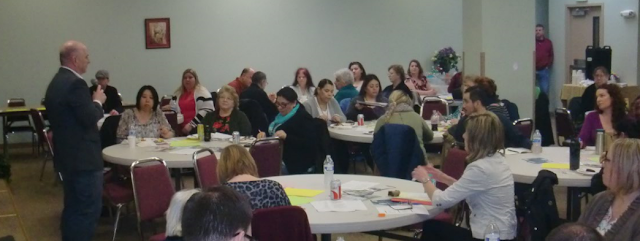Revised: January 2019
By Sarah Owens and Michael Livingston
 |
| Jimmy Jones speaking to the Emergency Housing Network about changes to the homeless voucher lottery. |
Yesterday at the Emergency Housing Network (EHN) meeting, staff of the Salem Housing Authority (SHA) and the Mid-Willamette Valley Community Action Agency (MWVCAA) announced SHA's intent to change its homeless voucher lottery system from random selection to a needs-based prioritization system (which means it's no longer a lottery).
MWVCAA's Jimmy Jones, who's recently been promoted from Coordinated Entry Specialist to the Director of the Community Resources Program, was there to explain the needs-based prioritization process, discussed here last November.
The lottery was suspended in the summer of 2016, and resumed only last month. It will remain unchanged (10 vouchers awarded each month through random selection, along with 5 domestic violence victim vouchers) through March and April.
In May, however, providers hoping to obtain a voucher for a homeless client must contact MWVCAA to have their client assessed and placed on a master list prioritized by degree of vulnerability. No change to DV voucher lottery is anticipated. Clients scoring into the highest levels of need on the master list of all persons assessed in Marion and Polk Counties will be offered one of the 10 homeless vouchers set aside that month.
The plan appeared to be well received. There were three questions from the audience: could clients manipulate responses to affect their VI-SPDAT score (no), could the data be broken out by county (yes), and what is the next step for the data being amassed (it will be used to inform local decision-making about allocation of resources)?
There were approximately 50 people in attendance, including UGM's CEO and former MWHI Task Force member, Bruce Bailey (red shirt, upper right corner of the photo). Some housing providers not represented at the meeting included Salem Interfaith Hospitality Network, which shelters up to four families in participating churches, and also runs a tenant-based rental assistance program funded with City HOME program dollars, and Grace House, which houses single women, no children, often straight from Coffee Creek, for up to six months. UGM, Salvation Army, St. Francis and Center for Hope and Safety were all present. Four members of the Home Base Shelters of Salem (HBSS) board were present, as well. HBSS is attempting, so far without success, to implement a Rest-Stop (aka "Safe Spot") type of program in Marion or Polk County.
Acceptance of the switch to a needs-based selection system is huge for this community, both because it's the first and biggest step toward the implementation of a true coordinated entry system, and because it's needed to implement the Mayor's proposal to target resources toward the chronically homeless. A first for this community, and long overdue.
The proposal for a Homeless Rental Assistance Program or HRAP to house 100 of Salem's chronically homeless residents over the course of a year comes before the Salem Housing Authority BOC Monday, March 13, at City Hall.
According to the overview published yesterday, the program budget is "$1.9M, with $1.4M requiring new funding." If the BOC gives the program the nod, which is expected, the matter will go before the Citizens' Budget Committee in April. As the chart above indicates, such program have been shown to save community resources in the long term, mainly in "Police-Jail" and medical, including behavioral health costs.
The prospects for approval appear to be favorable. Events over the past year, like the housing shortage and rising rents, the extended sub-freezing temperatures, the deportation actions and Muslim ban, the rise of hateful, racialized rhetoric and consequent fear, the prospect of deep cuts to housing, health insurance and other social care programs, which promise to make the situation even worse than it is, all these things, along with the "recovering" economy, a new City Manager, Mayor and Councilors, all these things seem to have made Salem officials more willing, not less, to think, plan and act more broadly/inclusively than they have in the past. However, to succeed, the City will need the cooperation of rental property owners.

Thanks for the update as I was unable to attend the meeting...hopefully Salem is going the right direction helping the needy in our city.
ReplyDelete